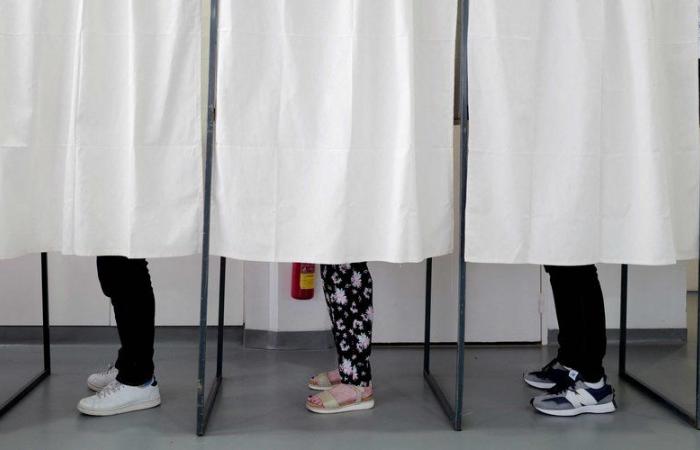
the essential
According to a survey, 44% of French people will vote in the legislative elections in order to block not the National Rally, but the presidential majority.
While the participation rate in the European elections only reached 51.49% according to the Ministry of the Interior, 64% of French people announce that they want to exercise their civil rights during the legislative elections according to the survey by the independent Odoxa institute published this Tuesday, June 25, 2024. Despite this growing mobilization, 56% consider the results to be written in advance: according to them, the National Rally will be victorious.
Read also :
INTERVIEW. Europeans: “The dissolution of the National Assembly is a poker move, which could lead to a breakthrough for the RN”
Notable point, it is not against the RN that the “blockade vote” will be concentrated, but against the two other major rival groups, the presidential majority (44%) and the New Popular Front (47%).
Read also :
Dissolution of the Assembly: how was Pascal Praud informed before Gabriel Attal?
Drastic drop in Emmanuel Macron’s popularity rating
The dissolution of the National Assembly on June 9, 2024, an attempt by Emmanuel Macron to regain his legitimacy among the French, will not have had the desired effect. The popularity rating of the head of state fell by 6 points during the month of June, falling to 27%. In comparison, Prime Minister Gabriel Attal receives 42% positive judgments.
Read also :
Legislative 2024: why did Emmanuel Macron dissolve the Assembly? Two weeks later, the answers become clearer
The “dam vote” does not mainly target the RN
If a section of voters (41%) aims to vote to counter the breakthrough of the National Rally, Jordan Bardella’s party is not the first targeted by this strategy. The “blockade vote” is in fact less against the RN than the presidential majority (44%) and the New Popular Front (47%). Questioned before the European elections, more than a quarter of voters had already expressed the intention of using their vote to “sanction (26%) rather than support (10%) the government” according to a survey by the independent institute Odoxa in partnership with Le Figaro dating from May 31, 2024.
Rise of the left in the polls
Since the announcement of the dissolution of the National Assembly, the political figure who has experienced the most striking resurgence in popularity in the polls turns out to be Raphaël Glucksmann (PS-Place Publique). The latter is in fact considered favorably by 33% of respondents, trailing Marine Le Pen (35%), Jordan Bardella (37%) and Edouard Philippe (40%). Three other major representatives of the New Popular Front stand out: the communist Fabien Roussel (5th with 29%), the Insoumis François Ruffin (6th with 28%) and the former socialist president François Hollande (7th with 27%).
Read also :
2024 legislative elections: Raphaël Glucksmann finally supports the New Popular Front
Mélenchon, the most reviled political figure alongside Eric Zemmour
Black sheep of the left, Jean-Luc Mélenchon has fallen by 6 points in public opinion. His popularity rating thus reached 14% (compared to 61% in May 2023). Alongside Eric Zemmour, the latter thus becomes the most criticized political figure in the history of the Odoxa political barometer. The leader of La France insoumise (LFI) nevertheless declared on June 22 that he was “obviously” ready to become Prime Minister if the left alliance won the legislative elections.
Read also :
Legislative elections 2024: “If he wants to be of service to the new Popular Front, he must keep quiet”: François Hollande reframes Jean-Luc Mélenchon
29% of French people do not fear the coming to power of the RN
As many as the French want the RN to come to power (28%), there are those who do not fear it without however wishing it (29%). Adding the latter to the first, the survey thus identifies 57% of citizens who are not repelled by the prospect of being governed by the RN, or even happy. Only 42% fear it and want the victory of one or more other parties. If there is one point on which the majority of citizens agree, it is the following: the RN is given the victory in the legislative elections by 56%, compared to 24% for the NFP and 18% for the presidential majority.





